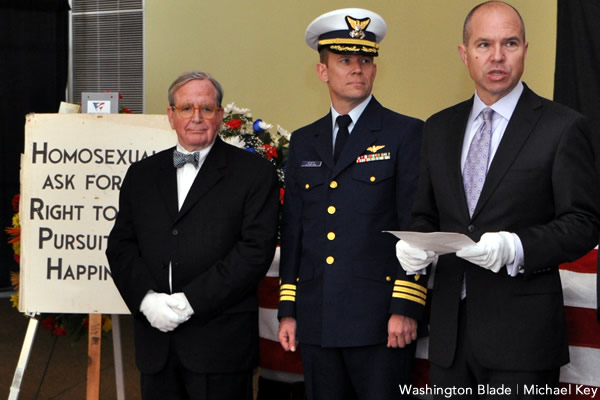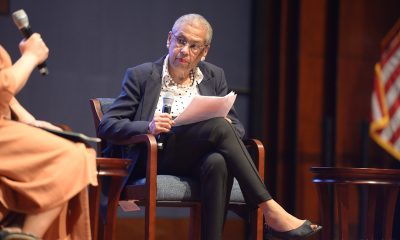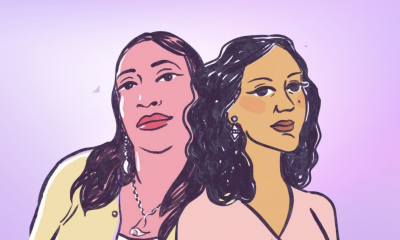Local
Police, military officials lead Kameny farewell
Mayor, Council members join friends, activists in memorial ceremony
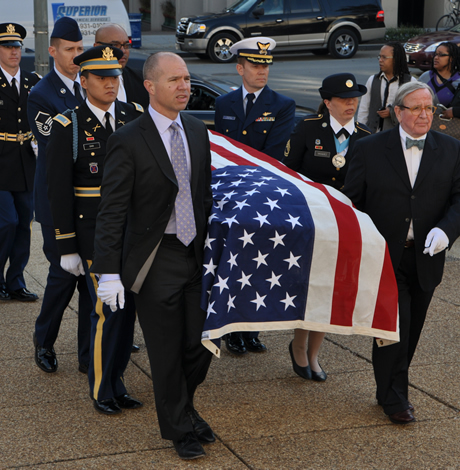
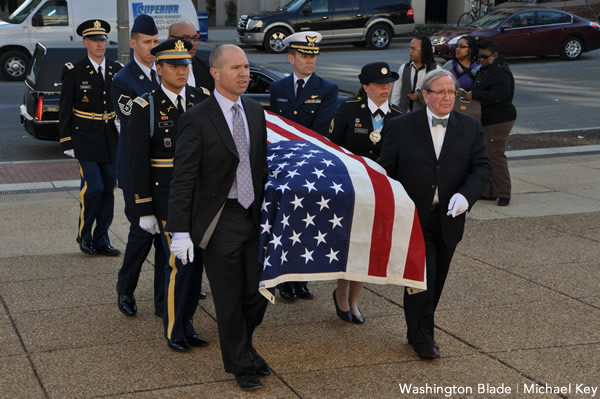
(Washington Blade photo by Michael Key)
A gay Air Force sergeant and four gay military veterans in full dress uniform joined gay D.C. Council members David Catania and Jim Graham as pallbearers at a memorial viewing on Thursday honoring the late gay rights pioneer Frank Kameny.
The contingent of pall-bearers, including gay former Army Lt. Dan Choi, carried an American flag draped coffin bearing Kameny’s remains into the main hall of the historic Carnegie Library in downtown Washington, where the viewing was held.
Friends and activists who knew Kameny during his 50 year tenure as one of the nation’s and D.C.’s leading LGBT rights advocates said the ceremony and memorial viewing of his closed coffin was a befitting sendoff for a man they said improved the lives of millions of LGBT Americans.
Members of the Gay Men’s Chorus of Washington opened the ceremony by singing the National Anthem as D.C. Mayor Vincent Gray, D.C. Congressional Delegate Eleanor Holmes Norton, four D.C. Council members and a contingent of friends and activists stood near the coffin.
Hundreds of activists, community allies, public officials, and D.C. residents who knew Kameny or knew of his work filed past the coffin between 3 p.m. and the start of the ceremony at 6:60 p.m. Among them was John Berry, director of the U.S. Office of Personnel Management, the highest ranking openly gay appointee in the Obama administration.
The Rev. Elder Troy Perry, founder of the Universal Fellowship of Metropolitan Community Churches, which caters to mostly LGBT congregations throughout the country, traveled from his home base in Los Angeles to attend the event. Perry, an outspoken advocate for LGBT rights for more than 30, worked with Kameny on national LGBT related projects in the 1970s and 1980s.
Mayor Gray said Kameny’s civil rights work led to a “massive, positive change” in the way LGBT people live their lives both in D.C. and across the nation.
“Frank Kameny is one of the most significant figures in the history of the American gay rights movement,” Gray told the gathering. “It was a poignant coincident that Dr. Kameny passed away on National Coming Out Day because he came out as a proud gay man in an era in which there were virtually no social and legal supports for sexual minorities who chose to live their lives openly in this country.”
Organizers of the ceremony, led by local activists and Kameny friends Charles Francis and Bob Witeck, placed at one end of the coffin a picket sign that Kameny made for a 1962 gay rights protest he organized outside the White House. The sign, still attached to its original wood stick handle, states, “Homosexuals Ask for the Right to the Pursuit of Happiness.”
At the other end of coffin stood a portrait of Kameny painted by local gay artist Don Patron.
Norton, a leader of the black civil rights movement, said Kameny’s acts of “defiance” and “raw, pure undiluted courage” during the decades he fought oppression against LGBT people put him in a place similar to that of black civil rights legend Rosa Parks.
Norton noted that Kameny began his fight for equality and justice for LGBT people shortly after he was fired for being gay from his job as an astronomer with the U.S. government in the late 1950s.
“Frank Kameny no more set out to sacrifice his livelihood when he refused to deny his sexual orientation to federal authorities than Rosa Parks intended to give up her work as a seamstress when she refused to move to the back of the bus,” Norton said. “Rosa Parks got tired of suppressing her full identity and her full dignity. So did Frank Kameny,” said Norton, adding, “There is a special place in our country for people like Frank Kameny. The phrase he coined, ‘Gay is Good,’ is every bit as significant as Black is Beautiful.”
Kameny died in his home Oct. 11 at the age of 86. Organizers of his memorial said a larger community memorial celebration of his life will take place Nov. 15 at a location to be announced.
“He was a great man who made it possible for me to be who I am,” said Rick Wood, a D.C. gay activist who said Kameny helped him organize the city’s first gay youth group 25 years ago.
“When I heard of Frank’s passing I was heartbroken but also grateful for the fearless and brave life that he led,” said Catania. “We’re all better off for having had Frank walk this earth. He changed minds and opened hearts to acceptance and tolerance in Washington and all over the world.”
Graham, who said he got to know Kameny during Graham’s tenure as director of the Whitman-Walker Clinic, called Kameny an “extraordinary” figure on the Washington scene for half a century.
“It is not possible to overstate the contribution that has been made by Frank Kameny for human rights, for gay and lesbian people and for everybody because, in point of fact, he was concerned about everybody,” Graham said.
Rick Rosendall, vice president of the Gay and Lesbian Activists Alliance and a friend and colleague of Kameny’s for more than 20 years, read from a chapter Kameny wrote for a book about the early “homophile movement” that was published during Kameny’s early years of activism. Kameny’s message in the book chapter was intended for a gay audience.
“It’s time to open the closet door and let in the fresh air and the sunshine,” Rosendall quoted Kameny as saying. “It is time to doff and discard the secrecy, the disguise and the camouflage. It is time to hold up your heads and to look the world squarely in the eye as the homosexuals that you are, confident of your equality, confident in the knowledge that as objects of prejudice and victims of discrimination, you are right and they are wrong, and confident of the rightness of what you are and the goodness of what you do. It is time to live your homosexuality fully, joyously, openly and proudly, assured that morally, socially, physically, psychologically, emotionally, and in every other way – gay is good.”
Joining the contingent of gay military pallbearers were four members of the D.C. Police Department’s Gay and Lesbian Liaison Unit, who served as pallbearers at the conclusion of the ceremony. With participants and well wishers lining the steps and plaza outside the Carnegie Library, the GLLU members and two of the gay military veterans carried Kameny’s coffin to a hearse on the street
Kameny’s friends and activist colleagues said they arranged for Kameny’s body to be cremated, based on Kameny’s expressed wishes, shortly after his death on Oct. 11. An urn bearing his ashes had been placed in the coffin for the ceremony.
Witeck said he and others close to Kameny had yet to decide on a burial site or other resting place for the Kameny’s ashes. One place under consideration, Witeck said, is D.C.’s Congressional Cemetery.
Maryland
Expanded PrEP access among FreeState Justice’s 2026 legislative priorities
Maryland General Assembly opened on Jan. 14
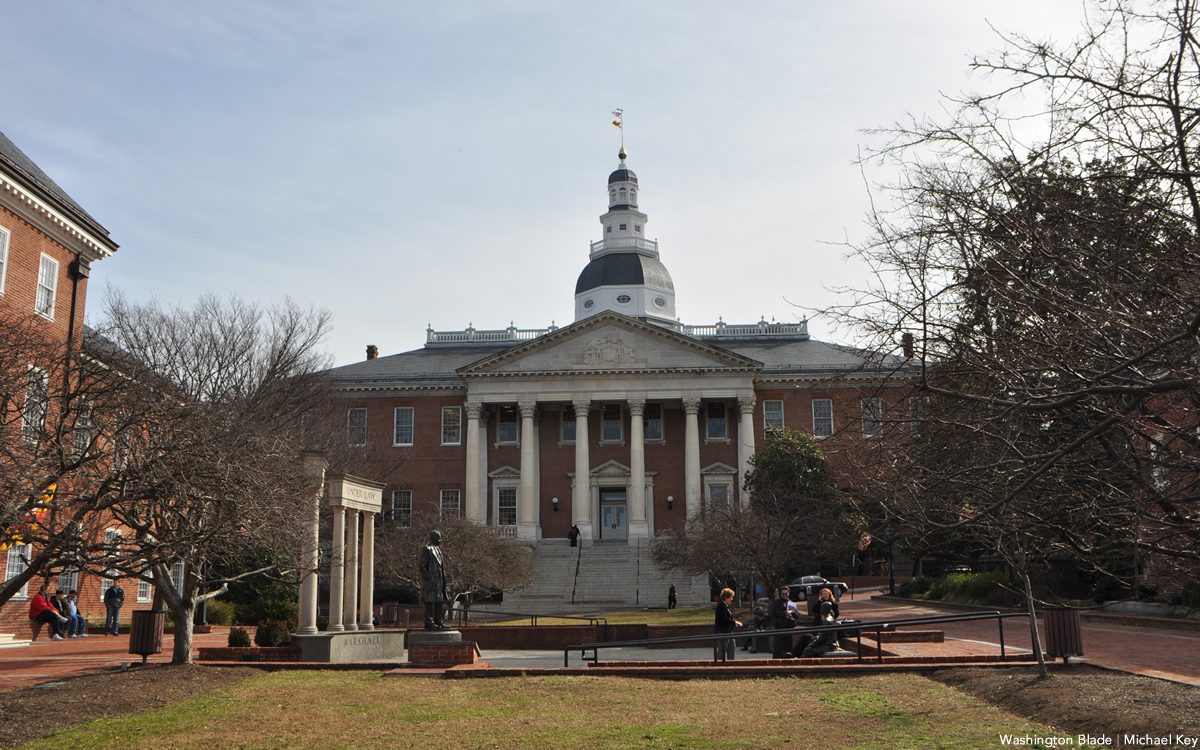
FreeState Justice this week spoke with the Washington Blade about their priorities during this year’s legislative session in Annapolis that began on Jan. 14.
Ronnie L. Taylor, the group’s community director, on Wednesday said the organization continues to fight against discrimination against people with HIV/AIDS. FreeState Justice is specifically championing a bill in the General Assembly that would expand access to PrEP in Maryland.
Taylor said FreeState Justice is working with state Del. Ashanti Martinez (D-Prince George’s County) and state Sen. Clarence Lam (D-Arundel and Howard Counties) on a bill that would expand the “scope of practice for pharmacists in Maryland to distribute PrEP.” The measure does not have a title or a number, but FreeState Justice expects it will have both in the coming weeks.
FreeState Justice has long been involved in the fight to end the criminalization of HIV in the state.
Governor Wes Moore last year signed House Bill 39, which decriminalized HIV in Maryland.
The bill — the Carlton R. Smith Jr. HIV Modernization Act — is named after Carlton Smith, a long-time LGBTQ activist known as the “mayor” of Baltimore’s Mount Vernon neighborhood who died in 2024. FreeState Justice said Marylanders prosecuted under Maryland Health-General Code § 18-601.1 have already seen their convictions expunged.
Taylor said FreeState Justice will continue to “oppose anti anti-LGBTQ legislation” in the General Assembly. Their website later this week will publish a bill tracker.
The General Assembly’s legislative session is expected to end on April 13.
Virginia
From the Pentagon to politics, Bree Fram fighting for LGBTQ rights
Transgender veteran running for Congress in Va.
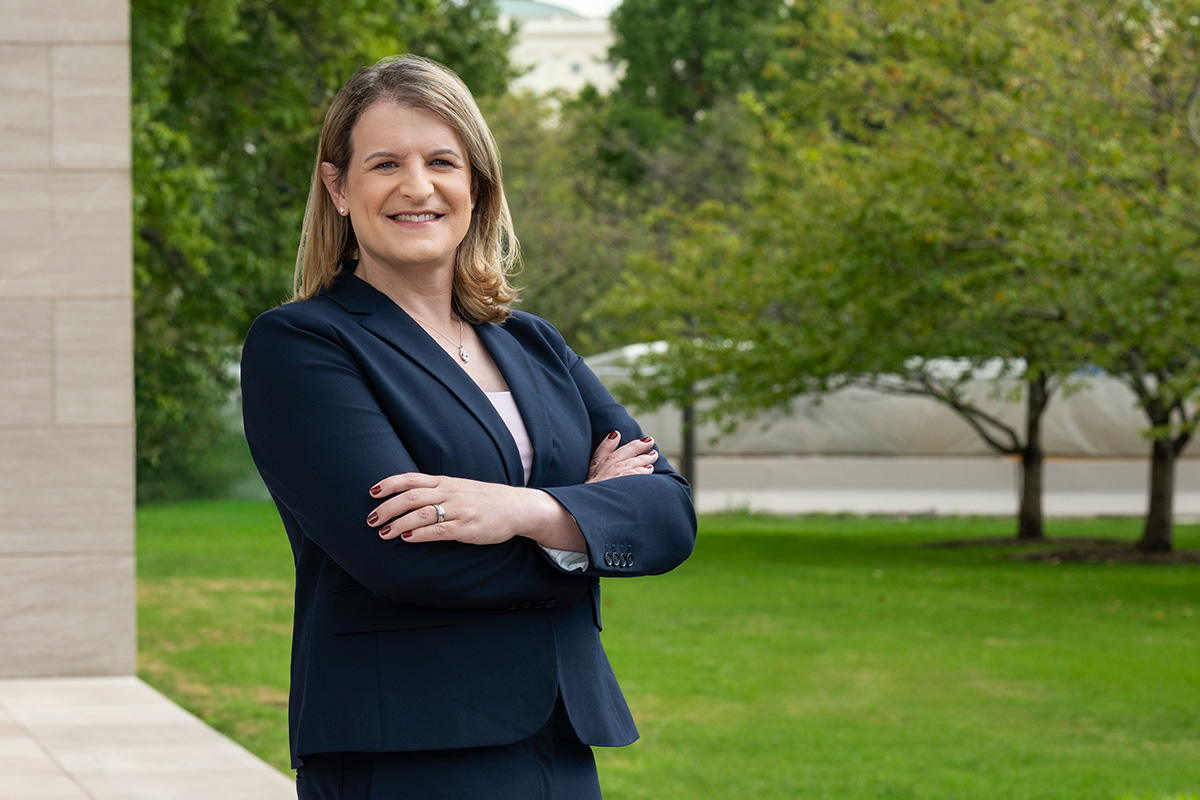
After being ousted from military service, Col. Bree Fram — once the highest-ranking openly transgender officer in the Pentagon — is now running for Congress.
Fram, who lives in Reston, Va., brings more than two decades of public service to her campaign. From the battlefield to the halls of the Pentagon, she spent more than 20 years working inside the federal government, often advocating for LGBTQ people and other marginalized communities from within the system.
Fram spoke with the Washington Blade about her decision to run amid sustained attacks against her — and against the LGBTQ community more broadly — from the Trump-Vance administration and far-right officials.
She said her commitment to public service began more than 22 years ago, shaped in large part by watching the Sept. 11, 2001, terrorist attacks.
“I had grown up expecting that there was this beautiful American peace stretching into the world for the foreseeable future, and that kind of image was shattered,” Fram told the Blade. “I realized that there was a continuous price to be paid to protect our democracy, to protect our freedoms. To be able to play a small part in defending those freedoms was incredibly important to me — to be part of something larger than myself.”
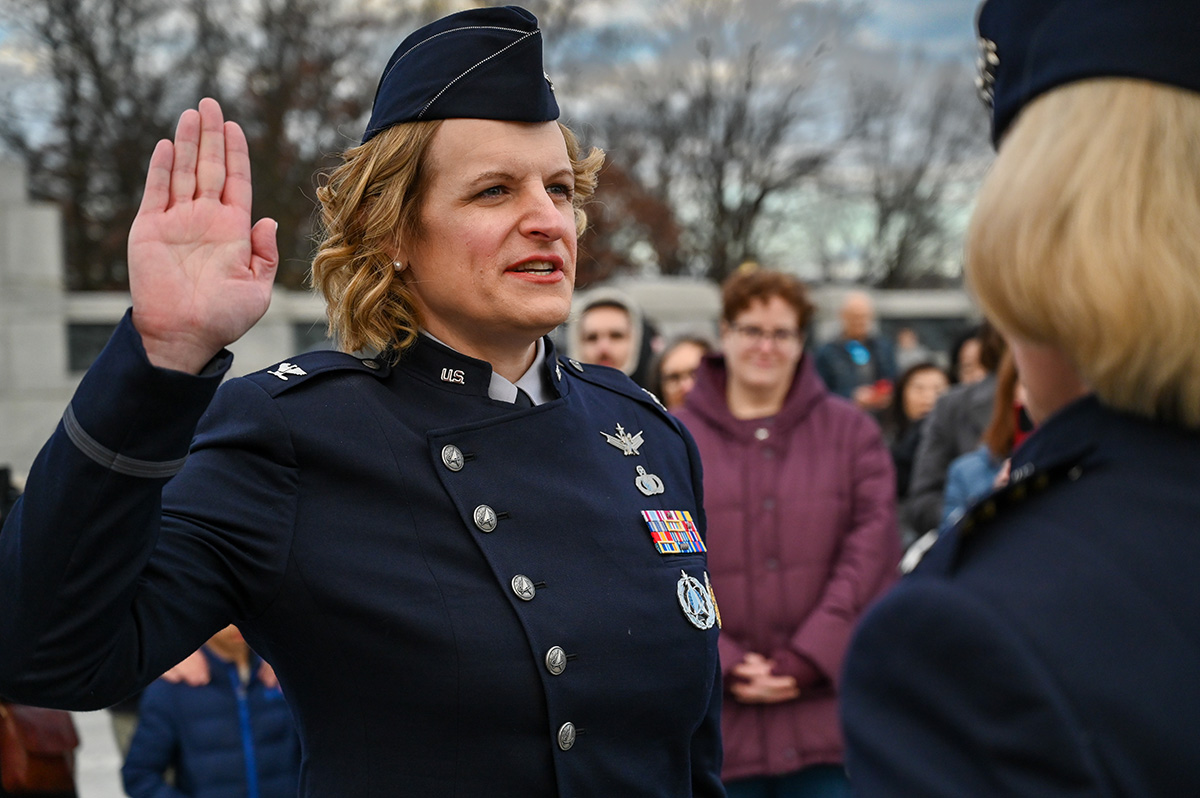
Commissioned through the U.S. Air Force Officer Training School in 2003, Fram served as an astronautical engineer and rose to the rank of colonel in the U.S. Air Force before later serving in the U.S. Space Force. She remained on active duty until 2025, when she was forced out following the Trump-Vance administration’s reinstated ban on trans military service.
Fram has been married for 20 years to her spouse, Peg Fram, and they have two children.
Beyond her military service, Fram has long been involved in advocacy and leadership. She has been a member of SPARTA, a trans military advocacy organization, since 2014, served on its board of directors beginning in 2018, and was president of the organization from 2021-2023.
Most recently, Fram served as chief of the Requirements Integration Division at Headquarters, Space Force, and as co-lead of the Joint Space Requirements Integration Cell in collaboration with the Joint Staff. Previously, she was chief of the Acquisition Policies and Processes Division for the assistant secretary of the Air Force for space acquisition and integration.
Earlier in her career, Fram served as a materiel leader at the Air Force Research Laboratory, overseeing the development of counter-small unmanned aerial systems and offensive cyberspace technologies in support of Pentagon and intelligence community priorities, managing an annual budget exceeding $100 million.
Her previous assignments also included oversight of Air Force security cooperation in four strategically significant Middle Eastern countries and 258 foreign military sales cases valued at $15.79 billion; serving as executive officer to the Air Force director of strategic plans, where she helped integrate the 30-year, $3.6 trillion Air Force Plan; a legislative fellowship on Capitol Hill with then-U.S. Del. Madeleine Bordallo (D-Guam), handling military, veterans, and foreign affairs issues; and a program management role at the National Reconnaissance Office, where she led a $700 million multi-agency engineering and IT contract overseeing more than 500 personnel and supporting $40 billion in assets.
Fram also directed 24/7 worldwide operations and maintenance of mission data processing for space-based and airborne national intelligence assets and co-led the Department of the Air Force’s LGBTQ+ Initiatives Team and Barrier Analysis Working Group from 2023-2025.
She holds a master’s degree from the Air Force Institute of Technology and is a distinguished graduate of the Naval War College. Fram deployed in support of Operation Iraqi Freedom, where she worked on airborne counter-improvised explosive device technologies.
In January, Fram, alongside four other trans military officers, was given a special retirement ceremony by the Human Rights Campaign — a direct result of President Donald Trump’s 2025 Executive Order 14183, titled “Prioritizing Military Excellence and Readiness.” The policy directed the Pentagon to adopt measures prohibiting trans, nonbinary, and gender-nonconforming people from serving in the military.
Under Virginia’s current congressional maps, Fram would challenge Congressman James Walkinshaw in a Democratic primary in the 11th Congressional District, which includes the city of Fairfax and most of Fairfax County. However, the district’s boundaries could change pending ongoing redistricting discussions in the state.
Fram emphasized that her decades working within the executive branch shaped her understanding of what it means to take — and uphold — an oath to the Constitution, even when those in power later forced her out of service solely because of her identity, not her performance.
“Through 23 years of service, I learned what it meant to fulfill that oath to the Constitution, and I wanted to continue serving,” she said. “But when this administration came in and labeled me and others like me ‘dishonorable’ and ‘disciplined liars who lack the humility required for military service,’ it hit hard. When the Supreme Court then agreed to let the administration fire all of us, I had to figure out what would allow me to continue my service in a way that was meaningful and lived up to that oath.”
After being told she would have to retire from a career she describes as her life’s calling, Fram said she began searching for another way to serve — a path that ultimately led her to run for Congress.
“I had done the work over the past couple of decades to understand the America that I believe in, that America I believe we all can be,” Fram said. “That’s where this decision came from. I believe I can fight back and fight forward for Virginians — with the knowledge I have and with a vision of the America we can be.”
That vision, she said, is one that has yet to be fully realized — despite decades of promises from Democratic leaders across all branches of government.
“This is about protecting our fundamental rights — freedom of speech, freedom to assemble, bodily autonomy, a woman’s right to choose, and the ability for queer people to live our best lives,” Fram said. “Right now, our government is throwing barriers up in front of many people. They’re strengthening them, building walls higher, and actively damaging lives.”
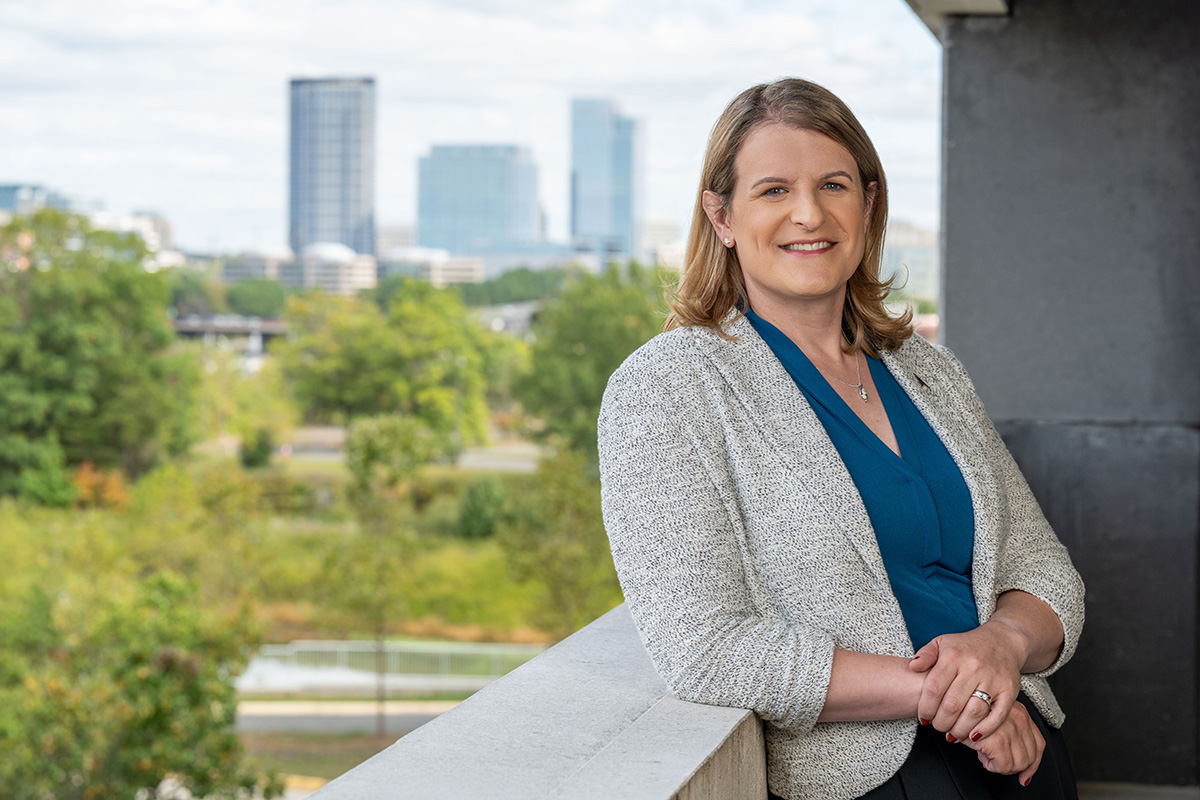
Fram said her leadership philosophy was shaped by watching strong, effective leaders during her time in the Air Force and Space Force — leaders who reinforced her belief that true leadership means expanding opportunity, not restricting it.
“Leadership is about tearing barriers down — not climbing over them and forcing others to suffer through the same things,” she said. “It’s about making sure the people coming up behind us have even more opportunity to go further, faster. How do we be better tomorrow than we are today? How do we fulfill our founding promise of life, liberty, and the pursuit of happiness?”
One way Fram said Congress could help dismantle those barriers is by passing the Equal Rights Amendment, enshrining constitutional protections for all people — particularly LGBTQ Americans.
“Getting the Equal Rights Amendment into the Constitution is absolutely critical to the future of queer rights,” she said. “Voting rights must also be clearly protected.”
Protecting democracy itself is also among her top priorities, Fram said.
“We need to take control of the House so we can put real checks on this administration,” she said. “That allows the American people to see how this administration is actively making their lives worse and less affordable — and it’s how we ultimately throw them out and get back to making life better.”
Fram said her experience working under four presidents — including during Trump’s first term — reinforced her belief that opposition to efforts curtailing civil liberties is essential.
“The primary thing we can do to protect democracy is to get rid of this administration,” she said. “Taking control of the House gives us true investigative power. Under every rock, there is likely an impeachable offense because they are failing to faithfully execute the laws of the United States.”
For her, the message Trump is sending is clear — he and others close-minded to the LGBTQ community are threatened by the possibility of what someone truly dedicated to service can become.
“One of the reasons this administration had to throw us out and silence us was because we were an example of what was possible. We shined so brightly by meeting or exceeding every standard that they couldn’t hide us away by any other means except kicking us out.”
Fram acknowledged that her identity has been a political target since 2016, but said those attacks have never been grounded in her ability to lead or accomplish complex missions over more than two decades of service.
“If others want to attack me on my identity, I welcome it,” she said. “I’m focused on whether people can afford groceries or feel safe in their communities.”
“I’m happy to be a lightning rod for those kinds of attacks,” she added. “If it allows Democrats to advance an agenda that makes life better for Americans, they can come after me all day long. They attacked me while I was in the military, before I was ever running for office.”
On policy, Fram said affordability, health care, and safety are at the center of her agenda.
“No one should be afraid to go to the doctor or fear surprise medical bills that put them into debt,” she said. “Every American deserves access to affordable, high-quality health care.”
She also emphasized a willingness to work across party lines — even with those who previously politicized her identity — if it means delivering results for constituents.
“If someone wants to work together to make people’s lives better, I’ll work with them,” she said. “If they want to come after me based on who I am, they can waste their energy on that.”
Asked how she defines hope in the current political moment, Fram rejected the idea of passive optimism.
“Hope isn’t naive optimism,” she said. “Hope is doing the work — engaging people and bending the moral arc of the universe toward justice.”
She added that representation itself can be transformative.
“Just being in Congress changes the narrative,” Fram said. “It lets a kid say, ‘Oh my God — I could do that too.’”
District of Columbia
Eleanor Holmes Norton ends 2026 reelection campaign
Longtime LGBTQ rights supporter introduced, backed LGBTQ-supportive legislation
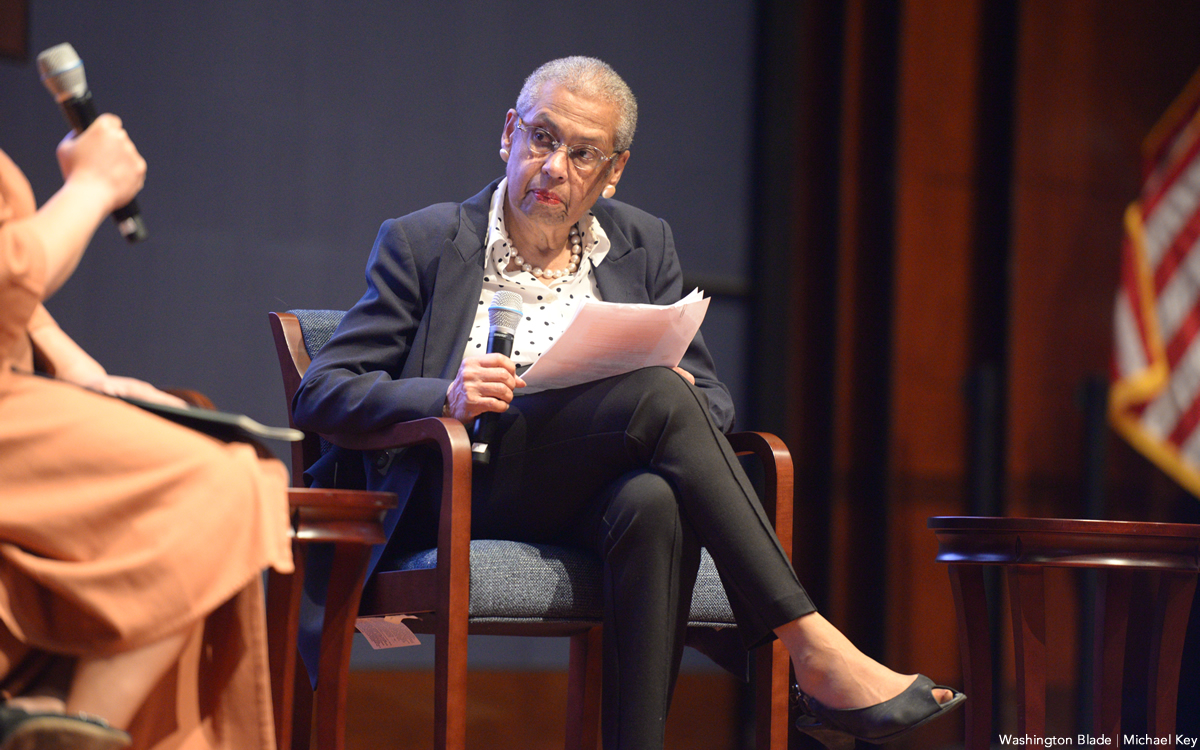
The reelection campaign for D.C. Congressional Delegate Eleanor Holmes Norton, who has been an outspoken supporter of LGBTQ rights since first taking office in 1991, filed a termination report on Jan. 25 with the Federal Elections Commission, indicating she will not run for a 19th term in the U.S. House of Representatives.
Norton’s decision not to run again, which was first reported by the online news publication NOTUS, comes at a time when many of her longtime supporters questioned her ability to continue in office at the age of 88.
NOTUS cited local political observers who pointed out that Norton has in the past year or two curtailed public appearances and, according to critics, has not taken sufficient action to oppose efforts by the Trump-Vance administration and Republican members of Congress to curtail D.C.’s limited home rule government.
Those same critics, however, have praised Norton for her 35-year tenure as the city’s non-voting delegate in the House and as a champion for a wide range of issues of interest to D.C. LGBTQ rights advocates have also praised her longstanding support for LGBTQ rights issues both locally and nationally.
D.C. gay Democratic Party activist Cartwright Moore, who has worked on Norton’s congressional staff from the time she first took office in 1991 until his retirement in 2021, points out that Norton’s role as a staunch LGBTQ ally dates back to the 1970s when she served as head of the New York City Commission on Human Rights.
“The congresswoman is a great person,” Moore told the Washington Blade in recounting his 30 years working on her staff, most recently as senior case worker dealing with local constituent issues.
Norton has been among the lead co-sponsors and outspoken supporters of LGBTQ rights legislation introduced in Congress since first taking office, including the currently pending Equality Act, which would ban employment discrimination based on sexual orientation and gender identity.
She has introduced multiple LGBTQ supportive bills, including her most recent bill introduced in June 2025, the District of Columbia Local Juror Non-Discrimination Act, which would ban D.C. residents from being disqualified from jury service in D.C. Superior Court based on their sexual orientation or gender identity.
For many years, Norton has marched in the city’s annual Pride parade.
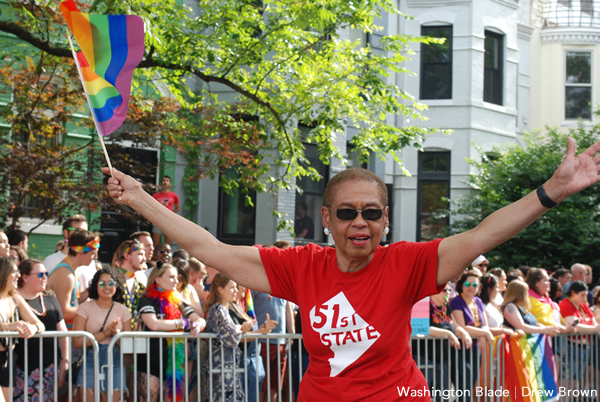
Her decision not to run for another term in office also comes at a time when, for the first time in many years, several prominent candidates emerged to run against her in the June 2026 D.C. Democratic primary. Among them are D.C. Council members Robert White (D-At-Large) and Brooke Pinto (D-Ward 2).
Others who have announced their candidacy for Norton’s seat include Jacque Patterson, president of the D.C. State Board of Education; Kinney Zalesne, a local Democratic party activist; and Trent Holbrook, who until recently served as Norton’s senior legislative counsel.
“For more than three decades, Congresswoman Norton has been Washington, D.C.’s steadfast warrior on Capitol Hill, a relentless advocate for our city’s right to self-determination, full democracy, and statehood,” said Oye Owolewa, the city’s elected U.S. shadow representative in a statement. “At every pivotal moment, she has stood firm on behalf of D.C. residents, never wavering in her pursuit of justice, equity, and meaningful representation for a city too often denied its rightful voice,” he said.
A spokesperson for Norton’s soon-to-close re-election campaign couldn’t immediately be reached for a comment by Norton on her decision not to seek another term in office.
-

 Real Estate4 days ago
Real Estate4 days agoConvert rent check into an automatic investment, Marjorie!
-

 Theater4 days ago
Theater4 days agoSwing actor Thomas Netter covers five principal parts in ‘Clue’
-

 District of Columbia3 days ago
District of Columbia3 days agoEleanor Holmes Norton ends 2026 reelection campaign
-

 Honduras3 days ago
Honduras3 days agoCorte IDH reconoce a Thalía Rodríguez como familia social de Leonela Zelaya

